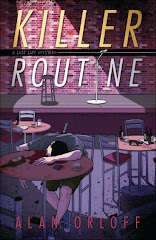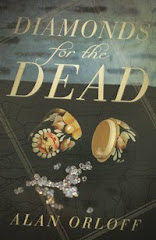With apologies to Mr. Revere:
"The ebooks are coming, the ebooks are coming."
(See Nathan Bransford's blog yesterday for another reason why.)
Although still just a small fraction of total book sales, ebooks have grown dramatically in the past year, and all signs point to a continuation of that trend.
What do I think will happen to the publishing industry in the face of the ensuing encroachment?
Beats me.
Of course, I AM an interested party. I DO write books. Changes in the industry WILL affect me. But whatever happens, I'll do my best to adapt. In the meantime, I'll keep plugging away. Good stories are good stories no matter how they’re delivered, right?
Enough preamble. I've read a lot of opinions about ebooks vs. print books, but I've never seen anyone discuss the "perception of impermanence" concerning documents in electronic form.
Years ago, in the real world, I managed a group of product managers. We'd write business plans and marketing plans to guide us in the development of new products. Because things changed frequently, and our plans evolved, we called these "living documents." We'd refer to different versions by the date of the latest revision.
In the years since, almost all my work has been done on the computer, where it's so easy to call up a document, make a few changes, and resave the document. No one knows if there's been a change, unless they've read both the "before" and the "after." How many of you have been confused by multiple versions of the same document on your hard drive? You all can put your hands down now.
So?
So when I read a printed book, I know it's the author's "final" say. The story is finished, in exactly the form he or she intended at that point in time (let's not quibble about editors' involvements or hurried writing due to deadlines or printing gaffes). Once a book is published, especially a novel, no further changes are made (except in rare instances, such as an edited second edition, or perhaps an altered/corrected paperback version). When it's done, it's done. Finito, complete, finished, fini, in the can. What you see is what you get.
That's all she wrote.
What's more, every single person reading that book reads the same words, in the same order. It's a shared experience (even though we all process the words differently, we still have the same, identical basis).
I don't get the same feeling when I read something in digital form. I know how easy it is to revise something. All an author has to do is make the changes and upload a revised version (to Amazon or whoever the electronic distributor is). Then everyone from that point on is reading a different book. Each subsequent change takes the document farther and farther away from the original.
Now I'm not saying this will happen. I'm simply saying it could happen. I'm also not saying that periodic revisions would make a book worse (probably the opposite). What I'm saying is, when I read something in digital form, I know it is not nearly as permanent as something printed. It feels more fleeting. It feels less substantial. It feels not quite finished.
This bothers me on some level. I mean, if there were 22 different versions of A PORTRAIT OF THE ARTIST AS A YOUNG MAN, how would high school students know which version to hate most?





















7 comments:
Awww. Poor James Joyce!
But I totally agree with you about the ebooks. I'm just trying to go with the flow and ignore all my reservations. I see that MI has a Kindle version of my book out. I assume it's the same as the print...but who knows. They might have corrected the one or two typos in there.
Elizabeth
Mystery Writing is Murder
This is an aspect of electronic publishing I hadn't considered.
Disturbing. I don't like like the concept, idea or possiblilty. Sigh...I really don't like the direction technology is going with regard to BOOKS.
I think ebooks (or some form of them) are here to stay. I agree with you about how easily it is to change the text digitally; I change some of my games all the time.
I'll still take a real book before a digital version, but then I'm ornery.
Elspeth
Elizabeth - Don't feel sorry for JJ, not after all the pain he inflicted on us poor students. I echo your "go with the flow" strategy.
Crystal - Technology marches onward. Whaddyagointodo?
Elspeth - It is easy to change digital text. You should have seen this blog post in its original form! I don't believe you are ornery for a second.
Alan - I, too, sometimes wonder about E-books. They don't have the same satisfying presence that paper books do. On the other hand, I've gotten access to dozens of books electronically that I probably couldn't any other way - at least not easily. And, as an aside, my univeresity's library includes about 30,000 E-books that students whose courses are all online can read. To me, that opens up a world of knowledge to those students.
As a write, I believe that we have to remember what business we are in. We are not in the book business. We are in the storytelling business. That's been evolving since wandering griots and minstrels of thousands of years ago used to sing their stories. It's going to keep on evolving, so if I want to keep telling my stories, I'd better evolve, too. Still, those "real" books are, I must admit, my favorite.
While I can see the value of e-books, to a point, being a sometimes train commuter - I like the feel of a book in my hand when I curl up in bed to read at night. There's nothing like the smell of a room full of printed books either. I don't see myself abandoning print for digital.
I'm torn over this topic. The technophile in me is thrilled by those thin e-readers and sci fi become reality. BUT, the book lover in me adores the dusty hardbacks on my hardwood shelves, the feel of paper beneath my fingers and black letters stamped on white pages.
Progress marches ever forward, so e-reader here I come, but I'll keep stockpiling a few beloved paper books. There are plenty of post-apocalyptic sci-fi scenarios too...
Post a Comment